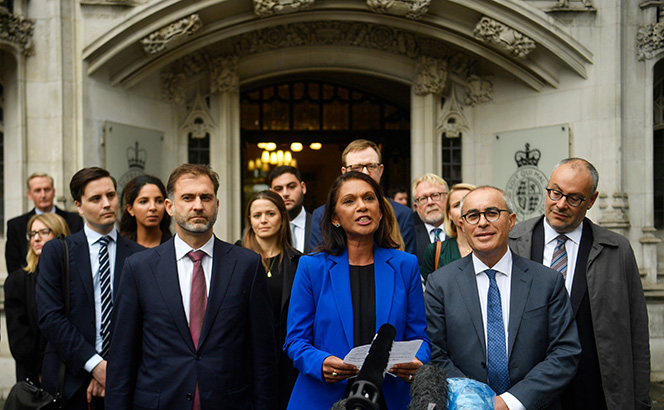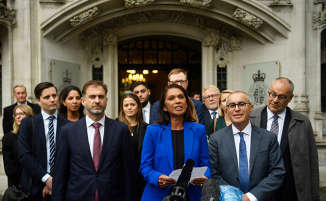Mischon de Reya and Blackstone Chambers are among the legal reputations seeing a significant boost this morning after securing a historic victory in the Supreme Court challenge to the suspension of Parliament by Prime Minister Boris Johnson.
Unveiling its verdict this morning (24 September), president of the Supreme Court Lady Hale said that the advice given to the Queen to suspend Parliament was ‘unlawful, void and of no effect’, leaving it to Commons’ speaker John Bercow to decide whether to recall MPs immediately. The much-awaited decision was handed down unanimously by 11 Supreme Court judges.
The challenge was brought by anti-Brexit campaigner Gina Miller with a legal team led by Mishcon partners James Libson and Rob Murray. The judicial review application saw Mishcon instruct Blackstone’s Lord Pannick QC and Tom Hickman QC. Blackstone silk James Eadie and Landmark Chambers’ David Blundell were counsel for the Government.
The case also saw Herbert Smith Freehills (HSF) involved when former Prime Minister John Major joined Miller in the legal challenge. Lead HSF partner Andrew Lidbetter instructed Edward Garnier QC and Tom Cleaver of Blackstone.
The Supreme Court ruling will be held in legal circles to be one of the most charged constitutional cases for decades. Lady Hale said that the ability of Parliament to make laws and hold the executive to account would be undermined if the Government could close Parliament. She added that the ‘prolonged’ prorogation was unusual and the effects on the fundamentals of democracy were ‘extreme’.
While the case was initially viewed by many lawyers as being unlikely to succeed, Miller’s legal team were widely acknowledged as having put forward a robust case, in contrast to a lacklustre performance from the Government’s lawyers. Mishcon’s Libson commented: ‘We are glad that the Court recognised the threat to the rule of law caused by a prorogation based on misleading advice given to the Queen. This second success for our client Gina Miller in the Supreme Court is a testament to her resolve to take whatever steps are required to ensure executive overreach does not become a feature of our democracy. This case shows that our courts can be relied on to hold the executive to account when necessary and is evidence of the robustness of our system of separations of powers.’
Johnson suspended Parliament for five weeks earlier this month in a controversial move that the Government argued was intended to allow time to formulate its Queen’s Speech legislative agenda. The move had been widely regarded as part of the Johnson administration’s drive to force the UK out of the EU by the 31 October deadline.
Miller and 78 MPs led by SNP MP Joanna Cherry QC brought separate legal challenges in English and Scottish courts arguing that prorogation was unlawful. London’s High Court initially ruled the case was not justiciable. But the highest court in Scotland ruled that Johnson’s advice on prorogation was unlawful as it was aimed at hindering Parliament. The Parliamentarians mounting the successful Scots challenge were advised by a team under Elaine Motion, chair of local practice Balfour + Manson.
The reverberations of the ruling will be closely watched at a time when the UK’s constitutional arrangements – including the role of the courts – are being strained by the increasingly fractious debate regarding Brexit and the possibility of a no-deal exit from the EU.
Speaking to Legal Business, Stephen Tierney, professor of constitutional theory at the University of Edinburgh, described the judgment as ‘remarkable’ and ‘innovative’.
‘It is a radical departure from our understanding of prorogation power,’ said Tierney. ‘There are two principals at stake: Parliament’s scrutiny but also accountability. The argument is that on that basis, prorogation power is a prerogative power.’ He added that the ‘remarkable innovation’ was that, while prorogation had previously been widely considered a matter for Parliament and its internal proceedings, today’s judgment meant that prorogation ‘is unlawful if it prevents Parliament carrying out its constitutional function without reasonable justification’.
Tierney concluded: ‘The whole Brexit process has strained the constitution and brought the courts under the constitutional spotlight in a pretty remarkable way.’
Legal challenges around Brexit have already generated attacks on the profession. Most notoriously, the Daily Mail in November 2016 controversially dubbed three senior judges ‘Enemies of the people’ in a headline reporting a ruling that the Government required Parliamentary approval to trigger article 50 notice to leave the EU.
In a likely sign of things to come, the Leave.EU campaign today responded to the latest ruling by tweeting: ‘Today a panel of unaccountable lawyers have totally overturned our constitutional order in a desperate attack on the democratic will of 17.4m British voters. This is a dark day for our country that will not be forgotten by the pro-Brexit majority.’
The profession reacts:
Fieldfisher regulatory and trade partner Andrew Hood, who was a legal adviser to former Prime Minister David Cameron, said the fact that the Supreme Court had reached similar conclusions to Scotland’s highest court was significant for the role and importance of Scots law. He also highlighted the practical implications of the ruling: ‘All the bills that were falling away – the trade bill, immigration bill, fishery and agricultural bills – are all there to be considered by Parliament. That’s hugely important if the idea of the Prime Minister is to leave the European Union by 31 October.’
Richard Atkins QC, chair of the Bar Council, said: ‘I have repeatedly said in recent days that it is vitally important that the rule of law is observed in the UK. Following the judgment of the Supreme Court in the Brexit case it is even more important than ever that those in positions of power think very carefully about what they say. The lawyers appearing before the Courts do not express personal opinions but act on behalf of their clients. I very much hope that there will now be a period of calm reflection and that we do not see any comments using inflammatory language or which seek to vilify the judges or lawyers involved in the Brexit (or any) litigation.’
Eversheds Sutherland head of competition, EU and trade Ros Kellaway told Legal Business the judgment was ‘very smart’ in that it also dealt directly with remedy: ‘It’s not just a strong judgment but it’s immediately effective: it’s up to the Speaker to resume Parliamentary business. The Government is not involved in that. There is not an order they can scrutinise or criticise or review. It avoids any argument about what this is and what it means by making it clear that prorogation is void.’ Kellaway added that the ruling was a ‘strong assertion of Parliamentary democracy and the ability of the Supreme Court to rule on what is and what is not justifiable in terms of the prerogative powers. It puts prerogative powers into a smaller box. What they are and what they are not is a matter for the Supreme Court to decide.’
Sally Shorthose, intellectual property partner at Bird & Bird, reflected: ‘The decision is extraordinary and I’ve never known anything like it. The unanimous ruling is almost unprecedented and the impact on Brexit is yet to be decided and everybody is running around shouting and screaming. The most likely outcome is that we’ll get an extension on Brexit now unless [Johnson] can pull a rabbit out of the hat. Can he stay with “do or die” now constitutionally? [The Supreme Court] has reinforced the supremacy of Parliament over the executive. It’s re-established independence of the judiciary and of Parliament and they’ve gone to great lengths not to mention Brexit and be diligent in not making political rulings, but saying it’s a constitutional decision.’
Legal Business itself took a jaded view of the lack of predictability of the English courts highlighted by the legal battle. The magazine noted on its Twitter feed: ‘This ruling will trigger typical self-congratulation that the legal profession indulges in about our judiciary. But what does it say about our system that the HC could rule the matter non-justiciable and the SC then support the case unanimously? Nothing flattering.’
Hogan Lovells head of public law and policy Charles Brasted argued that the long-term significance of the verdict was the ‘clarity and strength of the judgment, partly because it was unanimous, partly because of the way in which the court approached it’. He added: ‘There is now a clear position, that will be difficult to test for a very long time, that the [limits on] prerogative power include the idea that it must not interfere with other constitutional fundamentals. The limits of the prerogative power are defined by the importance of protecting Parliamentary scrutiny.’
He said that it was ‘crucial’ that the judgment didn’t go into the intentions of Johnson when he asked the Queen for the suspension of Parliament, as it meant the judgment didn’t give ‘detractors any scope to argue that [judges] overstepped the mark’ by getting into political arguments.
Brasted felt the judgment meant the likelihood of a no-deal Brexit on 31 October had reduced: ‘Parliament is going to be back sitting in circumstances where it will do everything it can to avoid a no deal.’ However, he concluded: ‘Any [request for] extension beyond 31 October is going to require a clear reason given to the EU. Some form of return to the people for a democratic mandate is going to be part of the narrative needed to get the extension.’
Pinsent Masons litigation partner Jim Cormack QC said: ‘The Justices were very astute in side-stepping the question of the Prime Minister and the Government’s motivations and what may or may not have been said to the Queen. The court astutely regarded those as hot topics which takes the ruling into the realm of politics. I suspect a lot will now be said about what evidence was put forward by the Prime Minister and the Government.’
marco.cillario@legalease.co.uk
Click here for the full judgment.
For more analysis of the constitutional fallout of the battle to quit the EU, see ‘Brexit vs Dicey’













